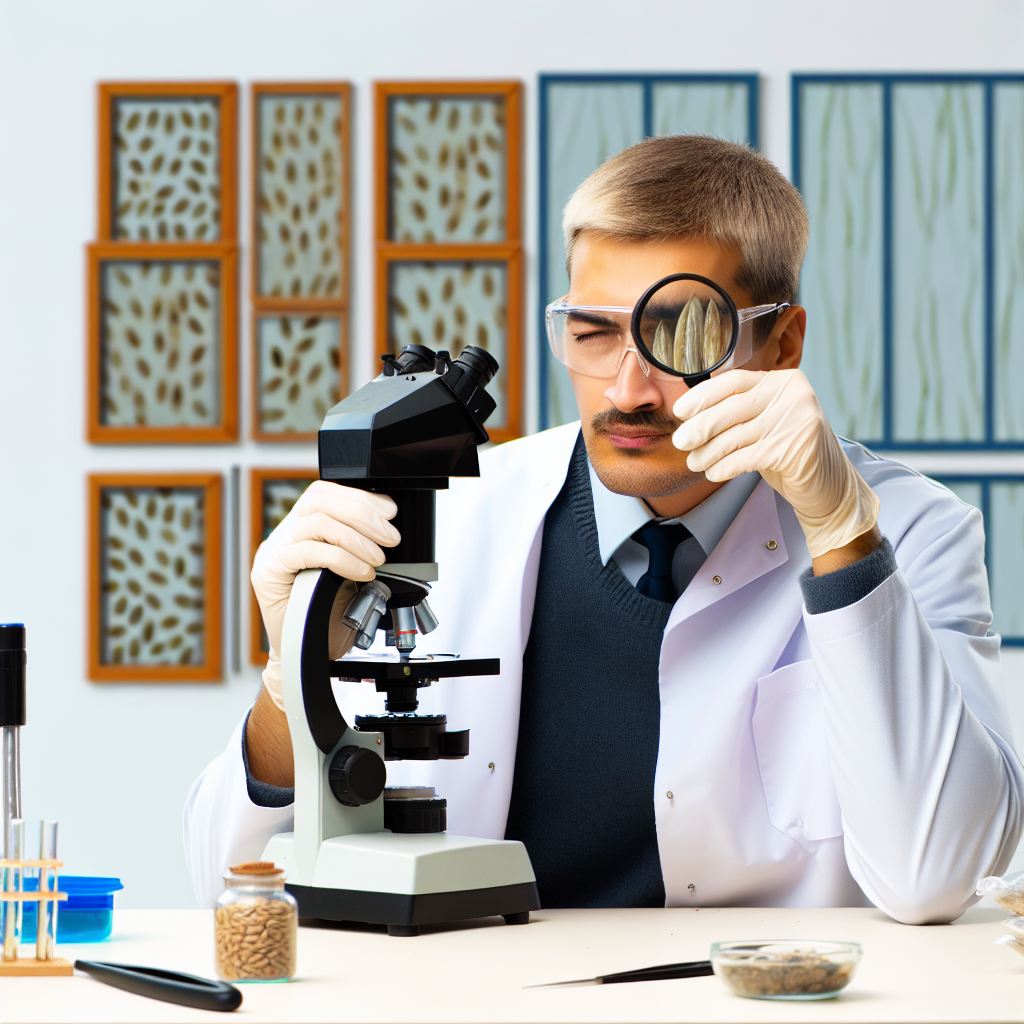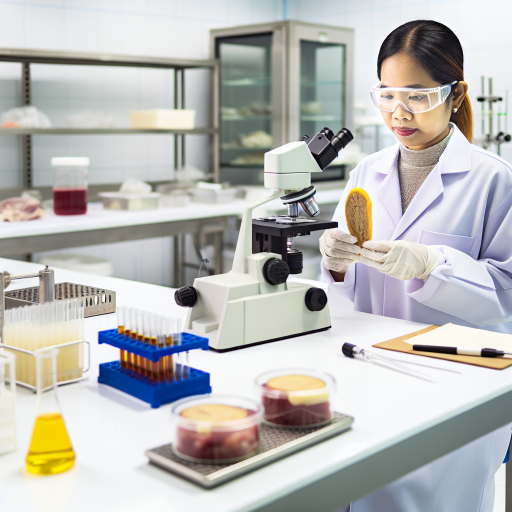Introduction
Seed technologists play a crucial role in the agriculture industry by ensuring the quality and viability of seeds.
Their work involves research, development, and testing of seeds to improve crop production.
Overview of Seed Technologists
Seed technologists are experts who specialize in studying seeds, their characteristics, and how to enhance their performance.
They work in various areas such as breeding, genetics, and seed production.
Importance of Tools in Seed Technology
Tools are essential for seed technologists to conduct their research and experiments effectively.
These tools help in seed processing, testing, and analysis.
They lead to the development of new seed varieties that are more resistant to diseases and environmental conditions.
Microscopes
Microscopes are essential tools for seed technologists to examine seed morphology in detail.
Seed technologists use microscopes to identify the physical characteristics of seeds such as size, shape, and color.
This information helps in determining the quality and purity of the seeds, which is crucial for seed production.
Types of Microscopes Commonly Used by Seed Technologists
- Light Microscopes: These microscopes use visible light to magnify the seed samples for observation.
- Stereomicroscopes: Also known as dissecting microscopes, they provide a 3D view of the seed surface.
- Scanning Electron Microscopes (SEM): These microscopes can provide high-resolution images of seed surfaces.
- Transmission Electron Microscopes (TEM): TEMs are used for examining the internal structure of seeds at a nanoscale level.
Importance of Accurate Seed Inspection for Quality Control
Accurate seed inspection is vital for maintaining quality control in the seed industry.
By using microscopes, seed technologists can detect any abnormalities or impurities in the seeds.
This ensures that only high-quality seeds are used for planting, leading to better crop yields.
Seed counters
Seed counting machines are essential tools used by seed technologists in the industry.
These machines are designed to accurately count the number of seeds in a sample, providing crucial data for seed testing and analysis.
Description of seed counting machines and their functionalities
Seed counting machines come in various models, but they generally work by funneling seeds through a sensor or camera that detects and counts each seed as it passes through.
Some machines can count hundreds or even thousands of seeds per minute, making the process quick and efficient.
Benefits of using seed counters for efficiency and accuracy in seed testing
- Increased efficiency: Seed counting machines can significantly reduce the time it takes to count seeds manually, allowing technicians to process larger volumes of samples in a shorter amount of time.
- Improved accuracy: Manual counting can be prone to errors, but seed counters provide precise and consistent results, ensuring reliable data for seed testing and analysis.
- Standardization: Using seed counting machines helps to standardize the counting process across different samples and technicians, reducing variability and maintaining consistency in testing procedures.
Examples of popular seed counting machines in the industry
There are several seed counting machines available in the market, each offering unique features and capabilities.
- Seedburo Seed Counters: Known for their accuracy and reliability, Seedburo counters are widely used in seed testing laboratories for their consistent performance.
- Romer Series Seed Counters: These machines are known for their high-speed counting capabilities, making them ideal for processing large batches of seeds quickly.
- Osborne Seed Counting Systems: Osborne offers a range of seed counting solutions, including both manual and automated counters, catering to different testing needs and preferences.
Seed counting machines play a crucial role in seed testing and analysis, providing efficient and accurate results for seed technologists.
By utilizing these tools, technicians can streamline their testing processes, improve data accuracy, and ensure consistency in their testing procedures.
Transform Your Career Today
Unlock a personalized career strategy that drives real results. Get tailored advice and a roadmap designed just for you.
Start NowYou Might Also Like: Common Tools Used by Agricultural Quality Inspectors
Moisture Meters
Moisture meters are essential tools used by seed technologists to measure seed moisture content accurately.
These devices provide precise readings that help determine the moisture levels in seeds, which is crucial for seed quality assurance.
Utilization of Moisture Meters in Seed Technology
Seed technologists utilize moisture meters to assess the moisture content of various seeds.
By measuring the moisture levels, they can determine whether the seeds are ready for planting or require further drying.
This information is vital to ensure the quality and viability of seeds.
Importance of Proper Seed Moisture Levels
Proper seed moisture levels are essential for seed germination and storage.
Seeds with inadequate moisture content may fail to germinate, while seeds with excessive moisture content are susceptible to molding and decay.
Maintaining the correct moisture levels is crucial for seed viability and storage longevity.
Different Types of Moisture Meters
There are several types of moisture meters available for seed technologists, each with its unique features and functions.
- Resistance-based moisture meters: These meters use electrical resistance to measure moisture levels in seeds.
- Capacitance-based moisture meters: These meters rely on the capacitance principle to determine seed moisture content.
- Gravimetric moisture meters: These meters weigh seeds before and after drying to calculate moisture content.
- Near-infrared moisture meters: These meters use near-infrared technology to analyze seed moisture levels.
Each type of moisture meter has its advantages and limitations.
Seed technologists select the most suitable meter based on their specific needs and preferences.
Overall, moisture meters play a crucial role in seed technology by ensuring that seeds are stored and planted at optimal moisture levels.
These devices help seed technologists maintain seed quality and viability, ultimately contributing to successful crop production and agricultural sustainability.
Explore Further: Quality Control Inspector: Ensuring Product Compliance
Seed Sorting Machines
Seed sorting machines play a crucial role in the seed industry by separating seeds based on various criteria.
These machines are designed to sort seeds based on size, shape, and color.
Seed sorting machines help in ensuring seed purity and uniformity, which are essential for quality control.
These machines increase efficiency, accuracy, and productivity in seed processing.
Showcase Your Business Today
Reach thousands of readers actively exploring professional services. Publish your business profile and grow your audience now.
Publish NowSome of the advanced machines used in the industry include optical sorters, gravity separators, and air screen cleaners.
You Might Also Like: Veterinary Collaborations in Dairy Science

Germinators
Description of germination chambers used to test seed viability.
Germination chambers are essential tools used by seed technologists to evaluate the viability of seeds.
These chambers provide controlled environmental conditions for seeds to germinate, ensuring accurate results.
The chambers are typically equipped with temperature and humidity controls, as well as lighting systems to simulate natural conditions necessary for seed germination.
Importance of seed germination testing for quality assurance.
Seed germination testing is crucial for assessing the quality of seeds before planting.
It helps seed technologists determine the germination rate, vigor, and overall viability of seeds, ensuring that only high-quality seeds are used for planting.
By conducting germination tests, seed companies can guarantee consistent and reliable seed performance for farmers.
Different types of germinators and their features.
There are several types of germination chambers used by seed technologists, each with its unique features and benefits.
- Constant temperature germinators: These chambers maintain a consistent temperature throughout the germination process, providing a stable environment for seed germination.
- Alternating temperature germinators: These chambers vary the temperature cycles to mimic natural fluctuations, promoting more robust seed germination.
- Lighted germinators: Equipped with fluorescent lights, these chambers provide the necessary light exposure for seeds that require it for germination.
- Variable humidity germinators: These chambers allow seed technologists to adjust humidity levels, creating optimal conditions for different seed varieties.
- Multi-tier germinators: With multiple shelves, these chambers maximize space efficiency and allow for testing multiple seed samples simultaneously.
Overall, germinators are indispensable tools in the seed industry, enabling seed technologists to assess seed quality accurately and efficiently.
By utilizing different types of germination chambers, seed companies can ensure the production of high-quality seeds for farmers, contributing to improved crop yields and agricultural sustainability.
Uncover the Details: Creating a Sustainable Farm Business Model
Data management software
Seed technologists heavily rely on data management software to analyze and manage the vast amount of data generated during seed performance testing and research.
These software programs play a crucial role in organizing, storing, and interpreting data to make informed decisions that drive advancements in seed technology.
Explanation of software programs
- Seed technologists often use software tools like Microsoft Excel, SAS, and R for data analysis and management.
- Microsoft Excel is commonly used for basic data manipulation and visualization, while SAS and R are more advanced tools for statistical analysis.
- These software programs provide seed technologists with the necessary tools to clean, transform, and analyze complex datasets efficiently.
Benefits of using data management software
- Using data management software allows seed technologists to track seed performance over time accurately.
- It enables researchers to identify trends, patterns, and correlations within the data that can lead to breakthrough discoveries.
- Data management software streamlines the research process, making it easier to share findings and collaborate with other scientists.
Popular data management software tools
- Microsoft Excel: Widely used for its user-friendly interface and versatility in handling various data types.
- SAS: Known for its powerful statistical analysis capabilities and extensive library of data manipulation functions.
- R: A popular open-source software for statistical computing and graphics, preferred for its flexibility and customization options.
Importance of Advanced Tools in Seed Testing
Seed technologists rely on various tools to ensure accurate and efficient seed testing processes.
These tools include moisture meters, seed counters, germination chambers, and purity analyzers.
Using advanced tools is crucial for seed technologists as it helps in obtaining precise results.
Such tools also maintain high-quality standards in the seed industry.
It is essential for seed technologists to stay updated on new technologies in the industry.
Staying informed enhances their skills and improves the overall seed testing process.
Additional Resources
Precision Agriculture in the Digital Era: Recent Adoption on U.S. Farms
Agricultural and Food Science Technicians : Occupational Outlook …
[E-Books for Sale]
The Big Book of 500 High-Paying Jobs in America: Unlock Your Earning Potential
$19.99 • 500 High-Paying Jobs • 330 pages
Explore 500 high-paying jobs in America and learn how to boost your career, earn more, and achieve success!
See All 500 High-Paying Jobs of this E-Book
1001 Professions Without a Degree: High-Paying American Jobs You Can Start Now
$19.99 • 1001 Professions Without a Degree • 174 pages
Discover 1001 high-paying jobs without a degree! Unlock career tips, skills, and success strategies for just $19.99!




